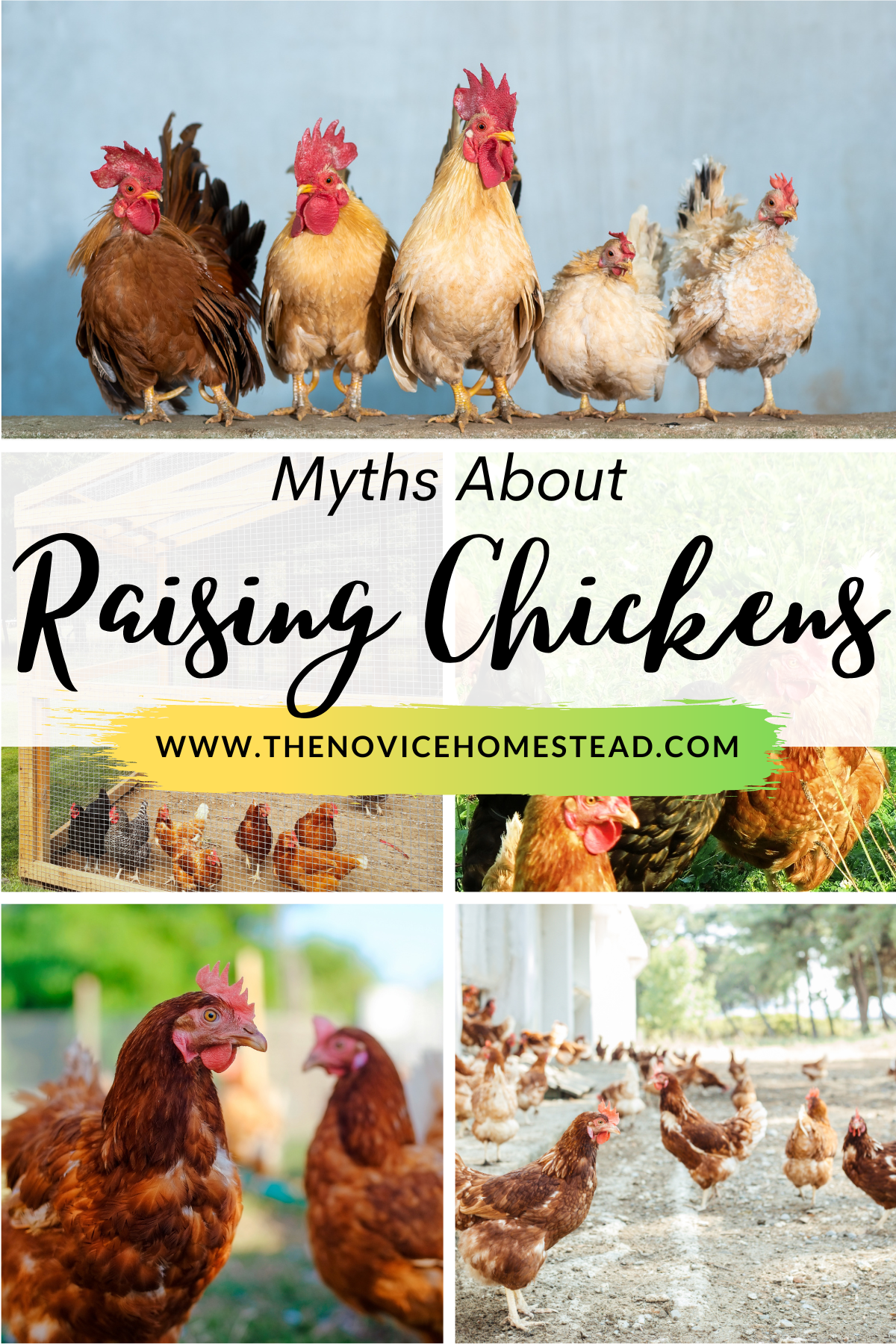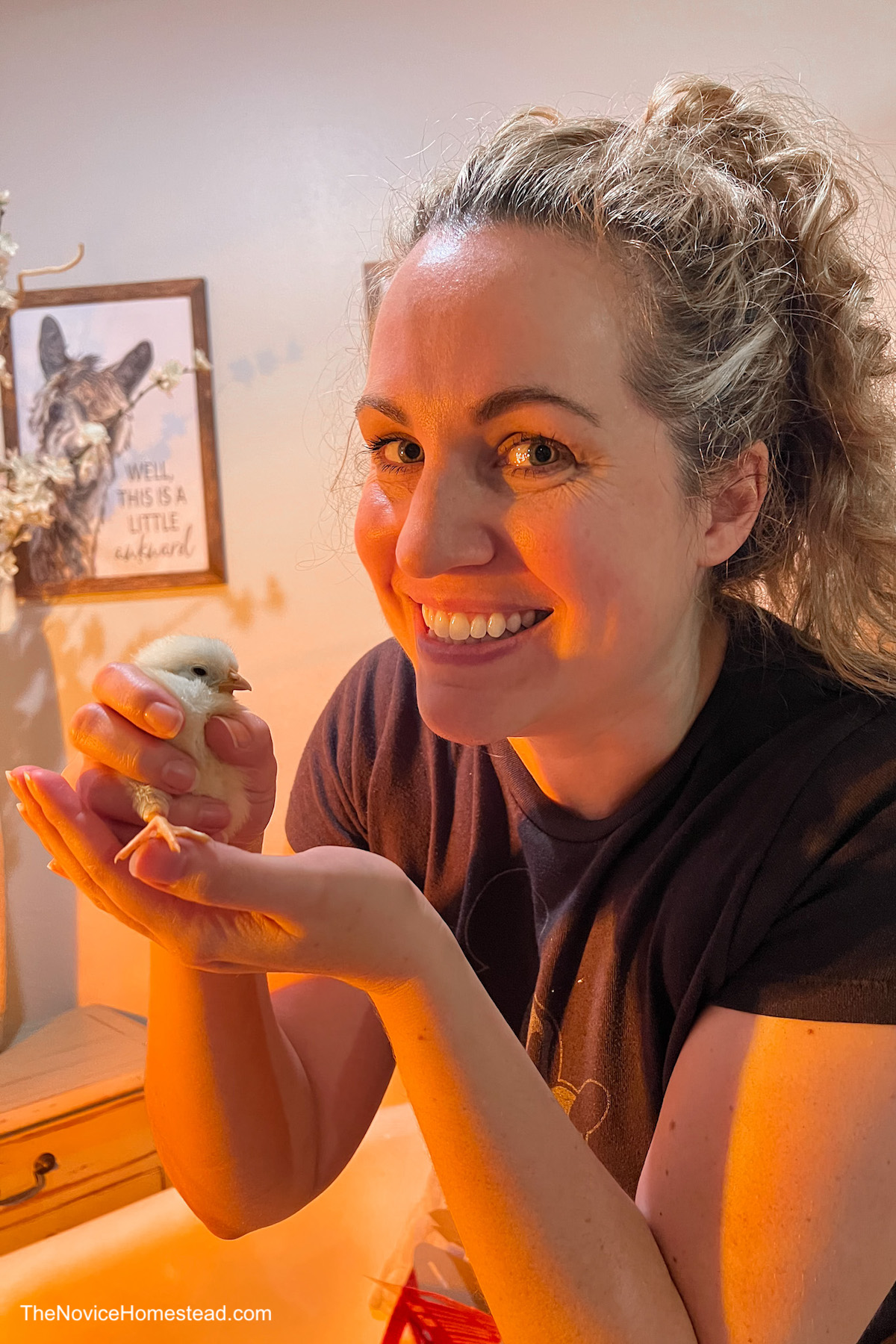Thinking about getting chickens? Here’s everything you need to know about raising chickens…that they don’t tell you!

8 Myths About Raising Chickens
Over the past couple years there have been a lot of people jumping into raising chickens for the first time. Perhaps it was something to do during that crazy year where we all had to stay home more often. Or maybe it was to try to save money when eggs skyrocketed in price at the grocery store.
Whatever the reason, there are a lot of new chicken owners out there. And that’s great! As a fellow chicken owner, I love to meet others who share my same obsession.
However, I’ve noticed that there are quite a few misconceptions going around about raising chickens. I’m sure that I believed some of these before I started my flock too. When you’re starting something new, you don’t know what you don’t know. And part of getting better at anything is learning as you go.
But I think that the more you know before you get started will help set yourself up for success! It can also help save you from heartache when something preventable goes wrong.
The following are 8 common myths about raising a flock of backyard chickens.
1. Raising Chickens Is Not Always Cheaper Than Buying Eggs
When the price of eggs skyrocketed recently, there was also a lot of people who decided to raise chickens for the first time. The thought was that it would be cheaper to raise chickens for eggs than to keep buying them from the store.
While I’m not going to say that it can’t be done frugally, for most of us chicken owners, it is more of a passion project than a money-saving hack.
There are a lot of expenses related to raising chickens:
- Buying a coop or the materials needed to build one – If you can repurpose or upcycle old materials (like I did for my first coop), that will save you the most money. However, you don’t necessarily want to skimp on your coop, as a cheaply made coop leaves your flock vulnerable to predators or storms.
- Feed – Chickens eat all day long and they need specific nutrients to produce good quality eggs. While you can absolutely feed your chickens certain kitchen or garden scraps, they need protein and calcium to produce eggs, as well as feathers during molting season. A good quality layer feed should form the basis of your chickens’ diet. Even if they free range, it is a good idea to have feed available for them as they like. You may be able to create your own feed recipe, but even that is not always economical unless you’re buying in bulk.
- Medical Care – Like any other animal, chickens will get sick from time and you’ll need to purchase medications and other supplies to care for them. For example, when treating bumblefoot you’ll use bandages at the very least.
- Random Stuff – You’ll need somewhere to store your farm fresh eggs (I use an egg skeltor on my countertop). You’ll need pest control supplies such as barn lime, pyrethrin spray, diatomaceous earth, etc. There’s always something you can do to improve your coop.
None of this is to say that it’s not worth it to raise your own chickens. As a “crazy chicken lady” I will always tell you that it is TOTALLY worth it! Just don’t expect it to be a money saver, that’s all.
2. They’re Dirty
That beautiful new chicken coop isn’t going to stay beautiful and new-looking for long! As soon as you put chickens in their new coop, they’ll get started making themselves at home right away.
Chickens poop 12-15 times a day, on average. They don’t use a designated “bathroom” area either – they poop right where they’re standing. They step in their poop. They poop while on their roost and it may get on the wall of the coop. To put it bluntly, chickens get poop everywhere.
Even with routine cleaning (I do a coop clean-out once a week), your coop is going to get dirty…fast. But just keep in mind that it’s not YOU that lives there and that it doesn’t have to look spotless to be ok for chickens.
TIP: I keep a separate pair of “chicken boots” that I wear in the coop and NOWHERE else. This helps prevent getting germs from your coop into your home, and vice-versa.
Related: How to Get Rid of Flies in a Chicken Coop
3. Everything Wants To Eat Them
One of the hardest things about raising chickens is protecting them from predators. Everything, and I mean everything loves chicken for dinner.
Hawks, owls, raccoons, bobcats, foxes, weasels, possums, coyotes, wolves, bears, and dogs will all eat full-grown chickens – and that is NOT an all-inclusive list.
Baby chicks and young pullets are even more vulnerable. Smaller predators, such as cats, snakes, and rats will go after chicks and juvenile birds.
Unfortunately, we often learn about our coop’s weaknesses after a predator attack. Even animals that may be friendly to us humans, such as pet dogs, will go after your flock.
Related: Learn more about how to predator-proof your chicken coop here.
4. They Don’t Lay Eggs Every Day
Another misconception about chickens is that you’re going to get an egg from every single one of them every single day. The average egg cycle is 26 hours, so most chickens will not lay an egg every day. On a good day, I’ll get eggs from 2/3 of my flock.
There are also many things that can cause chickens to slow down egg production or stop laying altogether. Some of these things are beyond our control.
Things that cause chickens to stop laying eggs:
- Molting
- Winter (less daylight)
- Age (chickens slow down as they get older and many eventually stop laying)
- Illness
- Stress
So if you have 6 chickens, don’t expect to get 6 eggs every day. You’ll also eventually need to add new members to your flock to make up for the older ladies who are slowing down.
5. Breed Matters
When you go into a Tractor Supply store, or a similar big farm store chain that sells chicks, they will often have a variety of breeds. It’s possible that some of those breeds are not the best option for your area, but you’ll need to do your homework first to know for sure!
If you live in a hot climate, you’ll want to choose chicken breeds that are heat-tolerant. Leghorns, Orpingtons, Rhode Island Reds, New Hampshire Reds, Barred Rock, and Welsummers are all good chicken breeds for places that experience hot weather. Chickens with large combs and lighter feathering are generally more heat tolerant.
On the other hand, if you live in a colder climate, you’ll want to look for cold hardy breeds. Heavier breeds and those with lots of feathering are better equipped for cold weather. Breeds with big combs may be more susceptible to frostbite.
Certain breeds have higher egg production than others. If eggs are your goal, you will want to look for “production breeds” for the highest egg output. Barred Rock chickens are one example of a production breed. My Barred Rock hens were excellent layers in their prime and they really did lay an egg almost every day.
To choose the best chicken breeds for your goals, you may want to find a local chicken breeder in your area. They’ll likely have birds that do best in your particular climate and they will be able to answer questions about the breeds they offer.
6. They’re Easy To Take Care Of
Easy is relative.
Most days, taking care of my flock is pretty simple. The automatic coop door lets them out into their run every morning at sunrise. Their waterer and feeder are large enough that I don’t need to refill them daily. All I need to do is toss them any scraps that I’ve collected throughout the day and collect eggs.
But not every day is easy like that.
Sometimes the automatic door malfunctions. Dirt, poop, pine shavings, and feathers can all block it from closing as it should. Cold weather or a low battery can prevent the door from opening all the way. I love an automatic coop door, but they are not foolproof and they do require periodic maintenance and troubleshooting.
Summers in Texas get really HOT. During those extreme heat waves, the chickens drink more water than normal. I also freeze big blocks of ice to help keep them cool when temperatures hit triple digits.
Winters in Texas are generally mild. However, that also means my birds are not as acclimated to cold, so a sudden freeze can be dangerous. During the big freeze of 2021, I had to go out to the coop many times throughout the day to break the ice on their waterer and make sure they were ok. I also insulated the coop temporarily for that week.
Do you like to travel? Well, you better have a dependable chicken-sitter! Even with automatic doors and waterers, you still want someone to physically check on your flock daily. That way a small issue doesn’t turn into a huge problem that no one is around to notice and fix.
Those are just a few examples of things that come up that will make your easy-peasy chicken operation a lot more complicated.
Again, every day is not complicated. Some days are very easy. But some days are not, so it’s important to know that and be ready. And it’s also important that you LOVE your chickens and it won’t seem as much like a chore!
Oh, and did I mention that baby chicks need a safe brooder for the first few weeks of their life, along with controlled temperatures and starter feed? They’re cute, but they need a lot of care before thy can be turned loose into a big girl coop.

7. Even If You Take Good Care Of Them, They Die
The average lifespan of a chicken is 5-10 years. However, even with the best of care, some chickens don’t make it that long.
Chickens can have heart attacks and pass away suddenly. Hens can also become “egg bound” and you usually won’t know until its too late.
Many times when chickens die without an obvious cause like a predator attack, you won’t know why unless you do a necropsy. I’ve never done that, in case you’re wondering. But if you did have an illness spreading through your flock, you would probably want to know what was causing it.
The point is, the circle of life is unavoidable.
8. You Have To Love It
As you can see, raising chickens isn’t for the faint of heart. They’re messy. They get sick. They don’t always produce a lot of eggs. They die.
You probably won’t save money raising your own eggs.
So why would anyone raise chickens then?
Because we LOVE it.
And if you get it, you get it.
More Tips For Raising Your Own Chickens:
- Guide to Raising Baby Chicks
- What is Pasty Butt in Baby Chicks?
- When Do Chickens Start Laying Eggs?
- How Often Do Chickens Lay Eggs
- How Cold is Too Cold for Chickens to be Outside?
- Farm Fresh Eggs 101
- How to Keep Chickens Cool in the Heat
- How to Keep Snakes Out of a Chicken Coop
- How to Keep Chickens From Eating Their Own Eggs
- What is Fowl Pox?
- How To Keep Mites Out Of A Chicken Coop
- 8 Ways To Tell If You Have a Hen or a Rooster